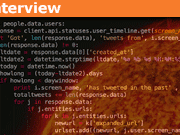Early Physics Education in High Schools For Physics Majors
Table of Contents
So You Want to Be a Physicist: A 22 Part Guide
Full Chapter List - So You Want To Be A Physicist... Series
Part I: Early Physics Education in High schools
Part II: Surviving the First Year of College
Part III: Mathematical Preparations
Part IV: The Life of a Physics Major
Part V: Applying for Graduate School
Part VI: What to Expect from Graduate School Before You Get There
Part VII: The US Graduate School System
Part VIII: Alternative Careers for a Physics Grad
Part VIIIa: Entering Physics Graduate School From Another Major
Part IX: First years of Graduate School from Being a TA to the Graduate Exams
Part X: Choosing a Research area and an advisor
Part XI: Initiating Research Work
Part XII: Research work and The Lab Book
Part XIII: Publishing in a Physics Journal
Part XIV: Oral Presentations
Part XIII: Publishing in a Physics Journal (Addendum)
Part XIV: Oral Presentations – Addendum
Part XV – Writing Your Doctoral Thesis/Desertation
Part XVI – Your Thesis Defense
Part XVII – Getting a Job!
Part XVIII – Postdoctoral Position
Part XIX – Your Curriculum Vitae
Introduction: The motivation for creating the series
One of the most frequent questions we get in various physics forums and IRC physics channels (besides the annoying ”can anything travel faster than c?”) is the process and background of being a physics major. Often, we have students asking what are the requirements of obtaining a physics degree, and what can one do with such accomplishments.
I am hoping that, in a series of postings on this topic, we get to go over and demystify the whole process of what one can expect as a physics major in college, all the way to going through a Ph.D program, and even beyond that in the land of postdoctoral work and employment. This is not as easy as it sounds, especially considering the wide-ranging educational systems we have throughout the world. So in most cases, the perspective I will tend to have the most understanding with is the US educational system. This is where someone from another country can come in and contribute their experiences and wisdom.
What I hope to impart is not only what is known, as described in various brochures and guidelines from many schools, but also what is never told to the students. Most of these come from personal experience, things that I found myself saying ”Boy, I wish someone would have told me that earlier!”.
As usual, feedback and questions are welcomed as this series progresses. Who knows, maybe after this, I may finally be inclined to compile all this into the book that I’ve always wanted to write! :)
Part I: Early Physics Education in High schools
Most of us have various reasons or impetus for wanting to go into this profession. I sometime liken it to wanting to be a priest (I have a bad joke to accompany that, but I won’t say it) – the calling towards it that somehow can’t be ignored. We all know that being a physicist would not make us filthy rich, but there is somehow an intrinsic satisfaction working in this field.
In this part of the series, I’d like to start at the beginning. No, not during conception, or while one is still in the womb (although it isn’t too late to read to a fetus about Newton’s Laws of motion). The preparation one makes while still in high school before proceeding to college can be important. The most important of which, in my opinion, is one’s mastery of basic mathematics. Typically, by the time someone enters college, there should already be a good command of algebra, trigonometry and geometry. Taking intro physics without a good command of these three is a recipe for disaster. In many cases, one also needs at least a semester’s worth of calculus if the intro physics class includes calculus.
Although this appears to be obvious, it isn’t. In my brief teaching experience at the freshman level (1st year students in a university in the US), I often found that many students struggled with their physics homework not because they did not understand the physics, but they could not do the mathematics. Of course, they then blamed the difficulty of physics for this without realizing that the physics course itself was not to be blamed. Interestingly enough, we often encounter similar situation on our IRC channel. Students coming in with physics problems are often stuck more with the mathematics.
So, adequate preparations in mathematics at the high school level is crucial. In the US, one can still catch up on the necessary basic mathematics even after enrolling in a university by taking which ever mathematics courses that one needs. However, this will mean delaying other physics courses till one has the necessary mathematics skill.
Are high school physics classes necessary? Definitely. It is always advantageous to have a flavor of the simple ideas of physics before hand. In the US, there is such a thing as AP Physics, where high school students get advanced physics lessons almost at the college level of intro physics. This can do nothing but add to one’s advantage.
Unfortunately, sometime these high school physics classes can backfire.
It is a sad reality that in many high school in the US, the physics classes are often taught badly, and often by someone without a physics degree. This has the negative effect of turning many students off this subject. Ask anyone who hates physics and chances are, they had a bad introduction to it in high school.
Next Chapter: Part II: Surviving the First Year of College
PhD Physics
Accelerator physics, photocathodes, field-enhancement. tunneling spectroscopy, superconductivity








I only missed good HS physics textbook indication for self study, like micromass did for mathematics in https://www.physicsforums.com/insights/self-study-basic-high-school-mathematics/
I mentioned this in Part III on Mathematical Preparations.
[URL]https://www.physicsforums.com/threads/so-you-want-to-be-a-physicist.240792/[/URL]
Zz.
[QUOTE=”ZapperZ, post: 5101504, member: 6230″]ZapperZ submitted a new PF Insights post
This is a good start- my only comment is that the post does not explain *why* a foundation in mathematics is so important- it’s the language of quantitative science. Not being prepared mathematically is like being semi-literate or worse. Just as one would not expect to be a music major without knowing how to read music, one should not expect to be a STEM major without knowing how to ‘read’ equations. A second reason is that the formal structure of mathematics provides a framework for logical thoughts/arguments and deductive reasoning.
Thank you, ZapperZ. I am just finishing my senior year of high school (Only a week left). I have taken AP Calculus AB and will still practice many problems over the summer. Unfortunately, I did not have the greatest high school physics experience. It's a good thing I was interested in the subject way before taking the class (Honors Physics). Are there any ways I can prepare over the summer before taking Physics for Science and Engineering I in the Fall? Perhaps some textbooks or online sources? I already own the Feynman Lectures, University Physics 13th Edition, and Giancoli's 6th Edition.
We're migrating this classic to PF Insights. Enjoy!